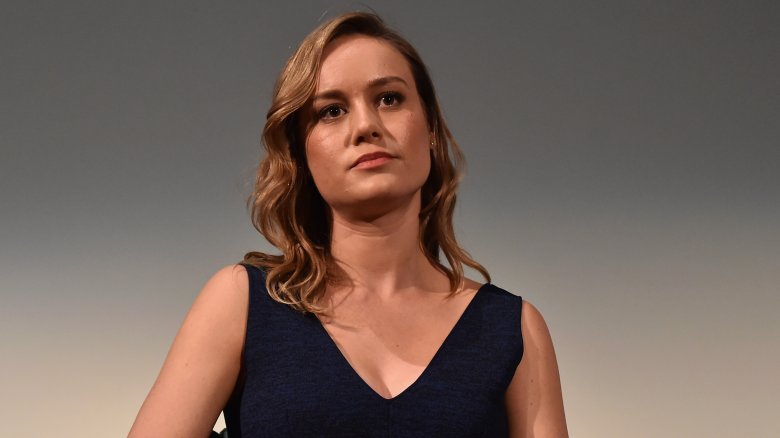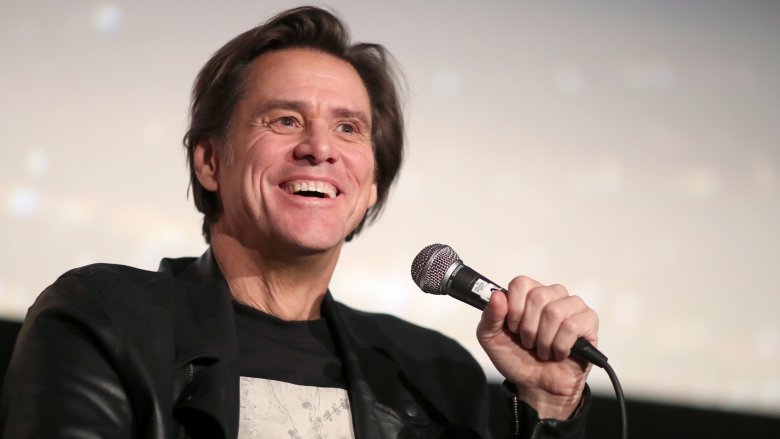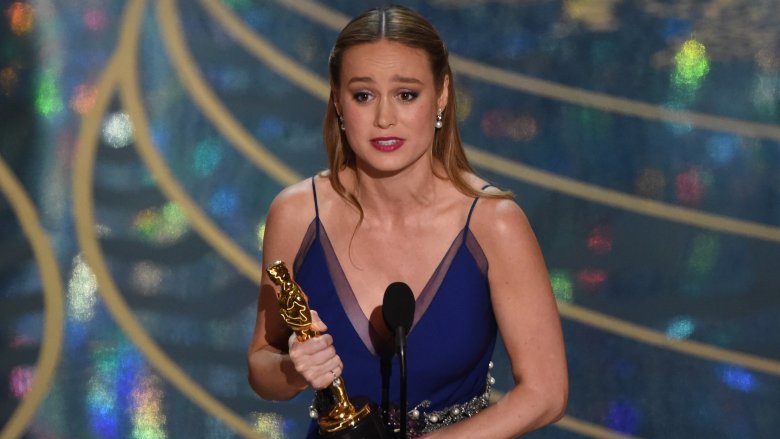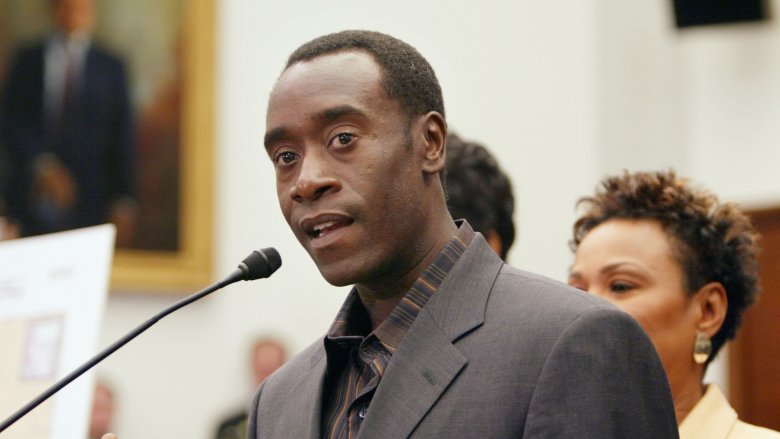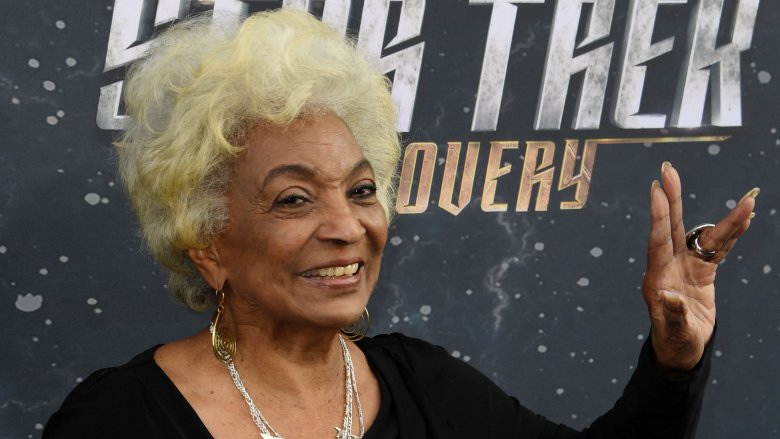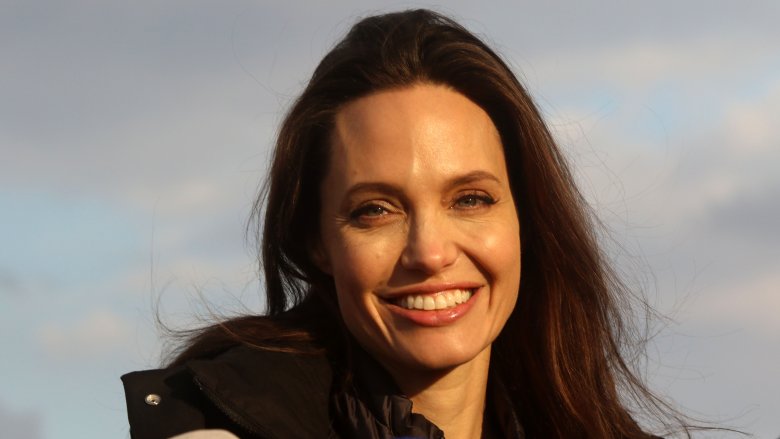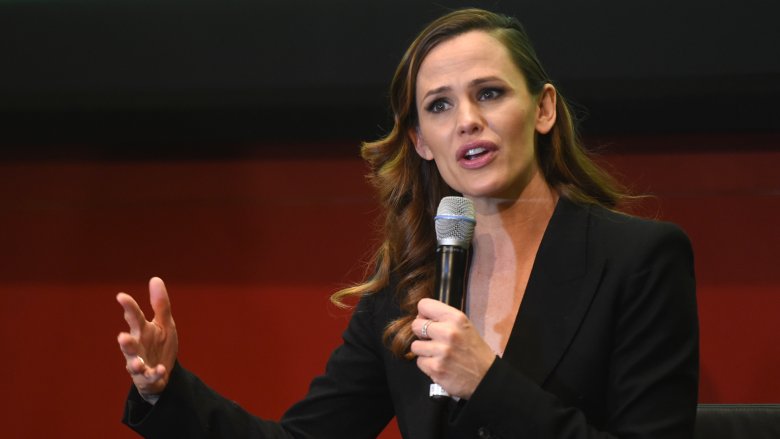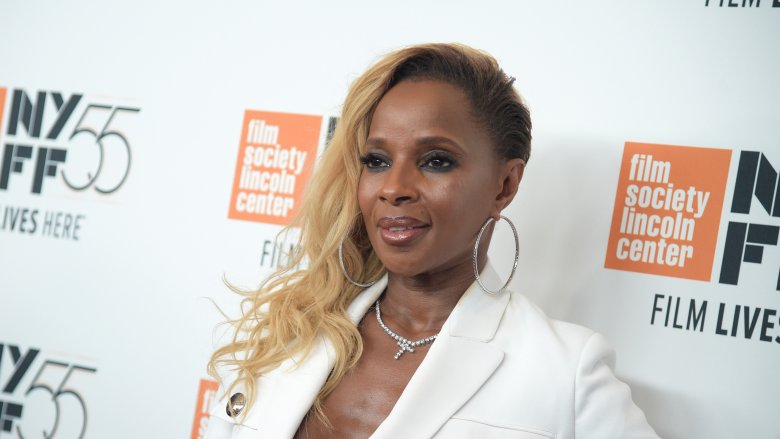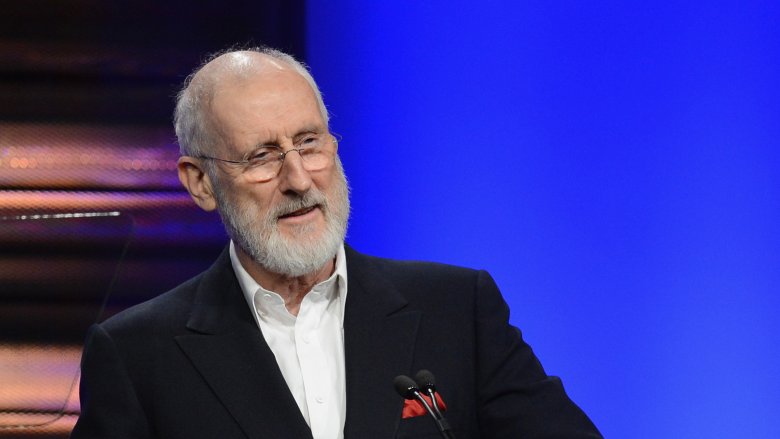Roles That Inspired Actors To Change Their Lives
It's relatively common for actors to go to great lengths to inhabit the characters they portray. In pursuit of a dynamic performance, they can conduct extensive research, learn new skills, and even alter their appearance. They spend months, and sometimes years, living inside the world of another person. It can prove to be a very intimate experience, one that can sometimes be nothing short of life-changing. For some performers, their experiences on the set ended up dramatically altering the course of their own lives in unpredictable and long-lasting ways. These transformations went far beyond superficial changes to influence the not only the way they see the world, but how they choose to interact with it. From personal activism to lifestyle choices, here's a look at some of the many stories about the ways in which taking on a part can end up changing the life of the actor who played it.
Jim Carrey got touched by an Andy
Jim Carrey worked hard to land the role of comedian Andy Kaufmann in 1999's Man on the Moon. He reportedly cut his $20 million fee in half and wasn't too proud to audition for the part. After he signed on, Carrey went fully method. "I broke a couple of times on weekends and stuff," he recalled, "but pretty much from when I woke up to when I went to bed, the choices were all [Kaufman's]." Recounting the experience to Jerry Seinfeld, Carrey compared it to "a possession."
Carrey's performance would forever change the way he looked at the world. In a contemporary interview conducted for the 2017 documentary Jim & Andy: The Great Beyond, Carrey explained how the role led to an existential crisis. "I didn't know who I was anymore when the movie was over. I didn't know what my politics were. I couldn't remember what I was about. Suddenly I was so unhappy and I realized I was back in my problems," he admitted. "Trying to grasp on to stuff like ... countries and religions and I find it all so abstract. Why am I an American? Why am I a Canadian? What is that? What does that mean?"
The actor has continued to question the nature of reality and the meaning of celebrity. Years later, he was interviewed at New York Fashion Week and said: "There's no meaning to any of this ... I wanted to find the most meaningless thing that I could come to and join and here I am ... I don't believe in icons."
Brie Larson took a stand for survivors
Brie Larson underwent a punishing routine to portray a young woman who survives a kidnapping in 2015's Room, restricting her diet and vitamin intake to match the experience of her character. She also spent six months of pre-production researching the effects of sexual abuse and long periods of confinement. Following this experience portraying a young mother who bears and cares for a son born of rape, Larson emerged as a powerful voice for survivors of sexual assault. On the same night she took home the Oscar for Best Actress, she stood up to hug all 50 sexual assault survivors who joined Lady Gaga on stage for a moving performance of her song from The Hunting Ground, a documentary about campus sexual assault.
In the years since, she's been vocal in opposing sexual abuse. She refused to applaud for Casey Affleck's Best Actor win when presenting him with the Oscar in 2017, telling Vanity Fair that her reaction "speaks for Itself" — a reference to Affleck's legal battles with two employees who sued the actor for sexual harassment. In response to a case that saw the accused convicted of rape yet still avoid jail time, she asked "when will we start supporting our brave abuse survivors instead of protecting their rapists?" She stepped down from an independent collective she co-founded after allegations of sexual misconduct on the part of some members were made public, and has tweeted about her own harassment experience.
Don Cheadle wrote the book on fighting genocide
Don Cheadle earned an Oscar nomination for his role as hotel manager Paul Rusesabagina in 2004's Hotel Rwanda. For the film's premiere, he traveled to Uganda and neighboring Rwanda, where he visited the Hotel des Milles Collines in Kigali, the place that inspired the story. It was his first experience there, and it certainly made an impact. After meeting with survivors of the genocide of the Hutu and Tutsis, Cheadle remarked that their stories "were the stuff of epic films." He also met with the Rwandan President, and toured camps in Uganda set up for refugees fleeing violence at the hands of rebel groups.
It lit a fire inside the actor, who in 2005 made another trip, this time to Sudan with John Prendergast, who worked in the Clinton administration before becoming a senior adviser for the International Crisis Group, a non-profit that seeks to prevent war. Together they visited a refugee camps in Darfur, and spoke with people there who related accounts of murder, rape, and forced evacuations. The pair ended up co-authoring a book about their experiences, Not On Our Watch: The Mission to End Genocide in Darfur and Beyond. The book urges U.S. citizens to demand that their government take action on behalf of imperiled nations.
Cheadle is also on the board of a charity named Not On Our Watch, an advocacy group cofounded by George Clooney.
Nichelle Nichols boldly integrated where no man (or woman) had gone before
Nichelle Nichols' reaction to her groundbreaking role as Lieutenant Uhura was similar to the one shared by many fans of Star Trek. "I fell in love with her," Nichols said. "She'll take no nonsense from anyone. She is a professional! The character is so strong. People from the south have told me that they were forbidden to watch the show because it was integrated."
The genre-defining space exploration series would go on to feature TV's first interracial kiss, between Nichols and castmate William Shatner. The network received "hundreds of letters of protest" in response, and Nichols became frustrated with her lines getting cut down from the original scripts. "I was thinking about leaving the show," Nichols explained, when she was invited as a celebrity guest to an NAACP fundraiser. When the organizers told her someone wanted to meet her, she assumed it was just a fan, "a Trekker."
That fan happened be civil rights leader Dr. Martin Luther King Jr., who told her "Uhura is more than just a communications officer. You're a symbol. The work you are doing, you may not know how important it is, but we who are fighting the good fight stop and watch you." Nichols decided to remain on the show.
After Star Trek finished its run, NASA came calling. They also saw Nichols as a symbol of progress and integration, and asked her to help them diversify. She was incredibly successful — among her recruits were astronauts Mae Jemison and Sally Ride.
Angelina Jolie raided tombs and discovered her calling in Cambodia
Though the first Tomb Raider film was a hotly anticipated release for fans of the record-breaking gaming franchise, it would end up sending leading lady Angelina Jolie's life in an entirely different direction.
While working on the film and its sequel in Cambodia, Jolie became aware of the plight of the Cambodian people and began relief work there. She was named as a UNHCR Goodwill Ambassador in early 2001; less than ten years later, she'd visited more 20 countries around the world, bringing awareness and aid to the Sudan, Chad, Syria, and Iraq, among others. "The courage, resilience and quiet dignity of returnee families rebuilding their lives against the kind of adversity few of us can imagine show the human spirit at its best," said Jolie of her work with refugees in Afghanistan.
In 2005, she launched the National Centre for Refugee and Immigrant Children, which provides free legal aid to asylum-seeking children without representation. After being awarded Cambodian citizenship for her work, she founded The Maddox Chivan Children's Center in 2006, a daycare facility — named after her Cambodian son — for children with HIV. She's won a slew of awards for her work, including the Citizen of the World Award from the United Nations Correspondents Association, and the Global Humanitarian Award from the United Nations in the United States for her work with refugees.
Jennifer Garner reconnected with her religious roots
When Jennifer Garner and husband Ben Affleck announced their intention to divorce in 2015, they released a joint statement saying, "we go forward with love and friendship for one another and a commitment to co-parenting our children." Divorce is never easy for anyone involved, especially when it's complicated by international fame. The experience led Garner to joke that "it's been a year of wine" when asked how she fared in the aftermath of her separation. It's not surprising, then, that Miracles from Heaven, the film that thrust her back into the Hollywood limelight for the first time since the divorce announcement, was an emotional experience.
Speaking to People about how her faith had helped her overcome personal challenges, Garner referred to a scene in Miracles from Heaven in which her character is experiencing a crisis of faith when her pastor tells her, "You know, everyone is going to struggle and I look at it this way: I've struggled with faith and I've struggled without it. And I'll tell you, it's a whole lot easier with."
Garner revealed how the film sparked conversations with her own daughters that inspired her to begin taking them to weekly church services again, something she'd done with her own family growing up in Virginia. "When I did move to L.A., it wasn't something that was just part of the culture in the same way, at least in my life," she added, "so it was a great gift of this film that it took us back to finding our local Methodist church and going every Sunday."
Mary J. Blige discovered her inner beauty
Musician and actor Mary J. Blige suffered through a very public separation from her manager and husband of over a decade, Kendu Isaacs, and channeled her pain into her first starring film role as Florence Jackson, the wife of a sharecropper in Mudbound. Director Dee Rees described how Blige fully became Florence on set, to the point where extras didn't know who she really was.
The transformation also had a profound effect on Blige's self-image. "I had to leave a lot of myself behind, a lot of Mary J. Blige behind," she explained. "A lot of wigs, a lot of lashes, a lot of makeup, a lot of nails, you know, the whole thing." She noted that stripping down to her natural hair texture was something she'd always feared. "Dee stripped me down all the way to what I truly am," she said, "and people were complimenting me. People were saying how beautiful I was. I didn't know I was that beautiful for real. You understand what I'm saying? I didn't know that."
Her performance earned her two Oscar nominations for best song and best supporting actress. Of the new direction her character pushed her in, Blige noted, "this is the next chapter."
James Cromwell couldn't stomach his costar
James Cromwell has been a vegetarian since the 1970s, but it was his experiences on set with his porcine costar in Babe that jump-started his transition to veganism and animal rights activism. "After having worked all morning with these extraordinary animals," he told the Humane Society in 2015, "I'd see their relatives on the lunch table. They had ham and duck, every animal except horse. That's when I said, 'I've got to try to be a vegan.'" Cromwell explained that the cause continues to be a central part of his life, including "all animal welfare — factory farming, spaying and neutering pets, our relationship to all sentient beings."
Cromwell and his wife have visited an orangutan sanctuary in Borneo, where he claims the Palm Oil trade has reduced their natural habitat, and that the creatures now live "In a very small, restricted area right across the river from a 5-million-acre palm oil plantation, which is only the third largest in Indonesia." In 2011 he lent his voice to the narration of the documentary Farm to Fridge, which explores animal abuse in the factory farming system. When asked what people should do to support animal rights he replied: "Go vegan! If you love animals, don't eat them!"
Bob Hoskins took a break from reality
Bob Hoskins was born to a working-class neighborhood in London, and tried work as a deckhand and circus laborer before stumbling into an audition by accident and becoming a theatre actor. He'd go on to be known as the "quintessential Cockney," appearing in a diverse array of films, from the 1980 gangster epic The Long Good Friday to Cher's love interest in the 1990 romance Mermaids.
For mainstream audiences, however, it was his turn as detective Eddie Valiant in 1988's Who Framed Roger Rabbit? that would define his career. It became the second highest-grossing film of the year, and much of the credit goes to Hoskins, whose performance with cartoon costars was incredibly convincing.
Hoskins initially had concerns that he'd booked an impossible job after watching films that combined live-action and animation like Mary Poppins, and ended up looking to his three-year old daughter at playtime for inspiration. She had many "invisible friends" and he worked to harness his own imagination. "I just concentrated on an immature imagination ... and I managed to actually see them, which was all right, but you do it for 16 hours a day for five months ... I started to lose control and hallucinate in all kinds of embarrassing places."
He described going to a party and talking to a woman "with a big hat and there was this weasel in her hat." When he returned from filming his daughter told him: "'Dad, slow down, slow down. You're going barmy, mate.' And I was." His doctor recommended he take five months off, but he reportedly left acting for a full year.
